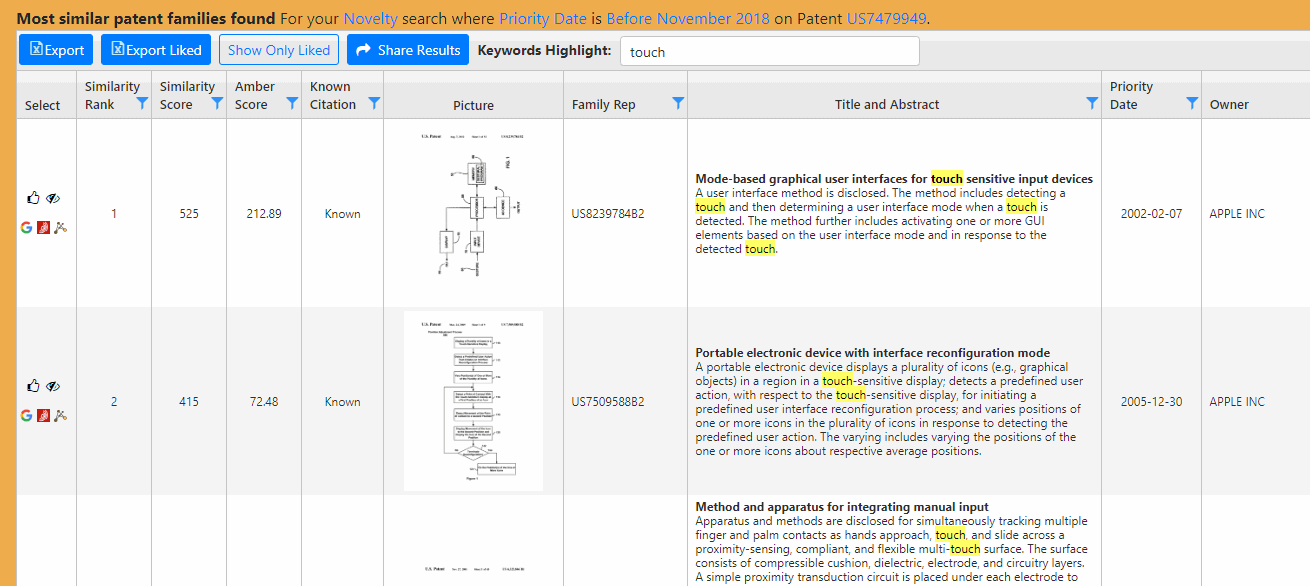Smart sharing of results is now available in Ambercite
NOV 13 2018 Ambercite has carved out an enviable reputation for the quality of its search results. All you need is one or two decent starting patents, and it will quickly find you a list of very similar patents.
But patent searching is rarely done alone. Patent examiners share their results with other patent examiners or even patent applicants. Corporate searchers share results with internal clients, IP managers with business managers, while patent attorneys and patent analysts share results with paying clients.
Ideally, these results should be shared in the easiest to understand format. However sharing of patent results is often done inelegantly - via formats such as table full of numbers, or other formats that make it hard for a reader to understand the context of a patent.
Ambercite Ai is designed by patent searchers for patent searchers, and as part of this, we have tried to make the review of patents as easy as possible, via easy to review images and abstracts,
As an example of this, consider a search for the 50 most similar patents to US patent 7479949 (widely regarded as “The Steve Jobs patent”, being a key patent for the original iphone). The search query in Ambercite is shown below:
This will return 50 patents, with the first three shown below.
Note the blue ‘Share Results’ button below:
If you press this, will produce a fully interactive url version of the results - which you can see for yourself by clicking here, or even on the image below.
You can share this url with anyone you choose, whether they are registered Ambercite users or not.
From this interactive version, you can click on the image or abstract for any patent shown, in order to open up the easy to use Patent Review Panel
Clearly this make sharing of results easier than before. Not only that, you can start to customise your results as well, as will be shown below.
How to customise the results - for example, showing Microsoft results only
Even better, we can start to customise the results. Not surprisingly, a lot of these patents are filed by Apple. But maybe I only want to report, for example, the patents filed by Microsoft?
To find Microsoft results, we can apply a simple filter on the search results:
This will produce a list of patents filed by Microsoft - and again you can click on this image to see a fully interactive version of this image.
Can your colleagues and clients then run new searches?
Yes, they will need to register themselves with Ambercite first, but after that, they will be able to run new searches for themselves.
Will the results change over time?
Each set of results is a set of results as at the time and date of the patent search. Imagine this as being similar to an spreadsheet of results you might export at the time. This will reflect the exact time of searching - but to run a new search, simply run the “Find Similar patents” button (providing that you are subscribed to Ambercite).
And then you can create a new link, with a different file name.
Can you keep the links for yourself as a record of your search?
Yes, simply store them somewhere safe.
Can other people find your results?
Each hyperlink is named with a long and random list of characters. No one else, including Ambercite staff, will be able to find this. BUT if you share this with people, you they will be open this at any time, or share it with others.
Again, imagine it as a spreadsheet of results you send to someone. Once that other person has recieved this, you need to rely on them to keep the spreadsheet safe. Same with the link - be careful whom you send it to.
Does Ambercite save your results even if you do not?
Not at all - if you do not choose to save your results using this new function, Ambercite will not save them on your behalf.
Many Ambercite users are understandably concerned about privacy of results, so our policy is that we do not save search queries or results to under to protect user confidentiality.
Ye, this new save and share function is an exception to this, but this is an exception under the full control of our users.
Is there scope to secure the links, or have a file management process?
We have thought about this, and in the longer term will probably implement something along these lines. But this is what we have for now.





